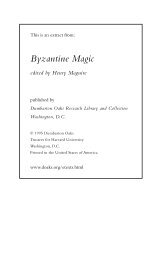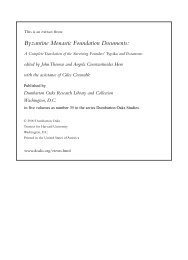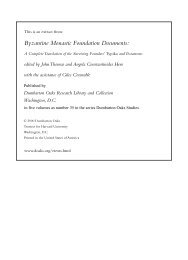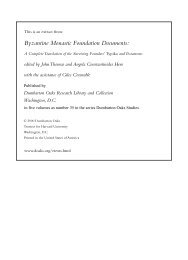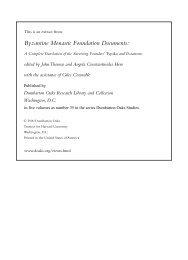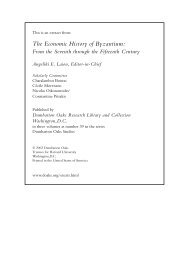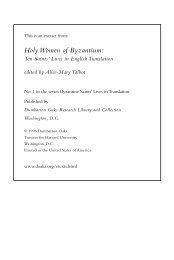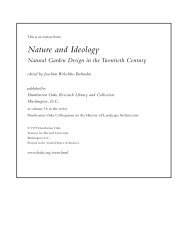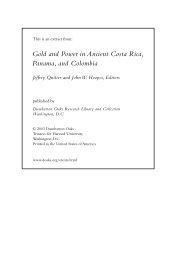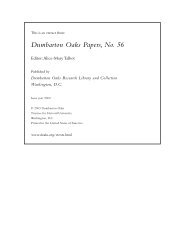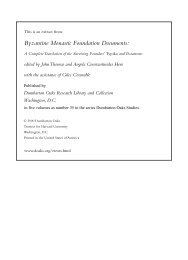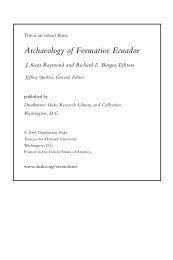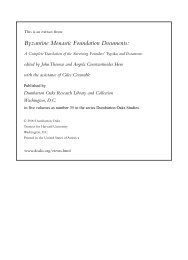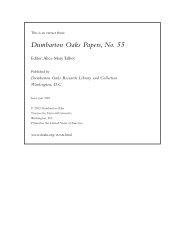Changing Economic Patterns in Latin Romania - Dumbarton Oaks
Changing Economic Patterns in Latin Romania - Dumbarton Oaks
Changing Economic Patterns in Latin Romania - Dumbarton Oaks
You also want an ePaper? Increase the reach of your titles
YUMPU automatically turns print PDFs into web optimized ePapers that Google loves.
David Jacoby [ 207 ]<br />
<strong>in</strong> the follow<strong>in</strong>g spr<strong>in</strong>g Giovanni Corner, already encountered five years earlier, <strong>in</strong>vested<br />
<strong>in</strong> Constant<strong>in</strong>ople <strong>in</strong> a bus<strong>in</strong>ess venture with Crete and Venice. 60 Not surpris<strong>in</strong>gly, therefore,<br />
the first wave of military settlers leav<strong>in</strong>g Venice for Crete <strong>in</strong> the autumn of 1211<br />
<strong>in</strong>cluded merchants such as Tommaso Viadro, who had previously traded <strong>in</strong> Crete, and<br />
others who had surely obta<strong>in</strong>ed <strong>in</strong>formation about the economic potential of the island.<br />
In addition, merchants arriv<strong>in</strong>g on their own <strong>in</strong> Crete also settled on the island <strong>in</strong> that<br />
period. 61 It is noteworthy that the charter delivered by Doge Pietro Ziani to the military<br />
cont<strong>in</strong>gent of 1211 conta<strong>in</strong>s several detailed provisions regard<strong>in</strong>g the future settlers’ trade<br />
<strong>in</strong> the island’s products. One of them deals with state control over wheat exports, a<br />
sensitive issue connected with Venice’s food supply. 62 Military settlers became <strong>in</strong>volved<br />
<strong>in</strong> <strong>in</strong>ternal trade and <strong>in</strong> the export of local commodities shortly after their arrival <strong>in</strong> the<br />
island. Some of them also <strong>in</strong>vested <strong>in</strong> maritime ventures and from 1218, or 1222 at the<br />
latest, even directly undertook trade journeys overseas. 63<br />
A similar conjunction of commercial, fiscal, and strategic factors and <strong>in</strong>terplay between<br />
private and state <strong>in</strong>itiatives provided the background for the <strong>in</strong>vasion of Crete by<br />
Enrico Pescatore <strong>in</strong> 1206 and for his efforts to secure his rule over the island, which<br />
eventually collapsed <strong>in</strong> 1211. Although Pescatore’s expedition was a private enterprise,<br />
Genoa displayed vivid <strong>in</strong>terest <strong>in</strong> it and provided large-scale naval, military, and f<strong>in</strong>ancial<br />
assistance to ensure its success. In 1208 the Commune responded to Pescatore’s request<br />
by send<strong>in</strong>g him ships, men-at-arms, and supplies, as well as money for the purchase<br />
of horses, obviously <strong>in</strong> Crete itself. In 1210 he requested further f<strong>in</strong>ancial assistance<br />
and, <strong>in</strong> return, promised Genoa a quarter with its facilities <strong>in</strong> each Cretan city, jurisdiction<br />
<strong>in</strong> the whole island, as well as full exemption from taxes to Genoese merchants.<br />
The charter he delivered was obviously modeled after those obta<strong>in</strong>ed by Genoa <strong>in</strong> the<br />
Crusader Levant. Pescatore further promised the reimbursement <strong>in</strong> three yearly <strong>in</strong>stallments<br />
of the f<strong>in</strong>ancial assistance provided by the Commune, to the amount of 18,000<br />
Genoese pounds, beg<strong>in</strong>n<strong>in</strong>g two years after the total subjection of the island to his rule.<br />
F<strong>in</strong>ally, he stated that the Commune would <strong>in</strong>herit Crete should he die without legitimate<br />
heirs. 64<br />
Genoa’s <strong>in</strong>terest <strong>in</strong> the economic and fiscal exploitation of the island was clearly con-<br />
60 DCV, nos. 516, 518.<br />
61 See Jacoby, “Colonisation,” 299–300, 303–8.<br />
62 G. L. F. Tafel and G. M. Thomas, eds., Urkunden zur älteren Handels- und Staatsgeschichte der Republik<br />
Venedig (Vienna, 1856–57) (hereafter TTh), 2:132 (victualia, here clearly wheat), 140.<br />
63 See Jacoby, “Colonisation,” 305–6, 308; M. Gall<strong>in</strong>a, “F<strong>in</strong>anza, credito e commercio a Candia fra la f<strong>in</strong>e<br />
del XIII secolo e l’<strong>in</strong>izio del XIV,” Memorie della Accademia delle Scienze di Tor<strong>in</strong>o, II. Classe di Scienze Morali, Storiche<br />
e Filologiche, 5th ser., 7–8 (1986): 13–21, 23–31, 41–68, passim. Borsari, Dom<strong>in</strong>io, 85–87, suggests that those<br />
who settled <strong>in</strong> Crete opted for security with less <strong>in</strong>come, rather for the high risk <strong>in</strong>volved <strong>in</strong> maritime trade.<br />
This assumption is not conv<strong>in</strong>c<strong>in</strong>g, nor is it plausible that the prestige of armed service acted as an additional <strong>in</strong>ducement<br />
to settlement <strong>in</strong> Crete, consider<strong>in</strong>g the attitudes, values, and <strong>in</strong>terests of the mercantile milieu. The<br />
case of Doge Ranieri Zeno to which Borsari refers cannot be considered typical.<br />
64 See G. Gerola, “La dom<strong>in</strong>azione genovese <strong>in</strong> Creta,” Atti dell’I. R. Accademia di Scienze e Lettere ed Arti degli<br />
Agiati <strong>in</strong> Roverete, 3d ser., 8.2(1902): 134–75; Borsari, Dom<strong>in</strong>io, 21–25, 27; D. Abulafia, “Henry Count of<br />
Malta and His Mediterranean Activities, 1203–1230,” <strong>in</strong> A. T. Luttrell, ed., Medieval Malta: Studies on Malta before<br />
the Knights, Supplementary Monographs of the British School at Rome (London, 1975), 113–19, repr. <strong>in</strong><br />
D. Abulafia, Italy, Sicily and the Mediterranean, 1100–1140 (London, 1987), no. iii; Maltezou, “Creta,” 763–67.



